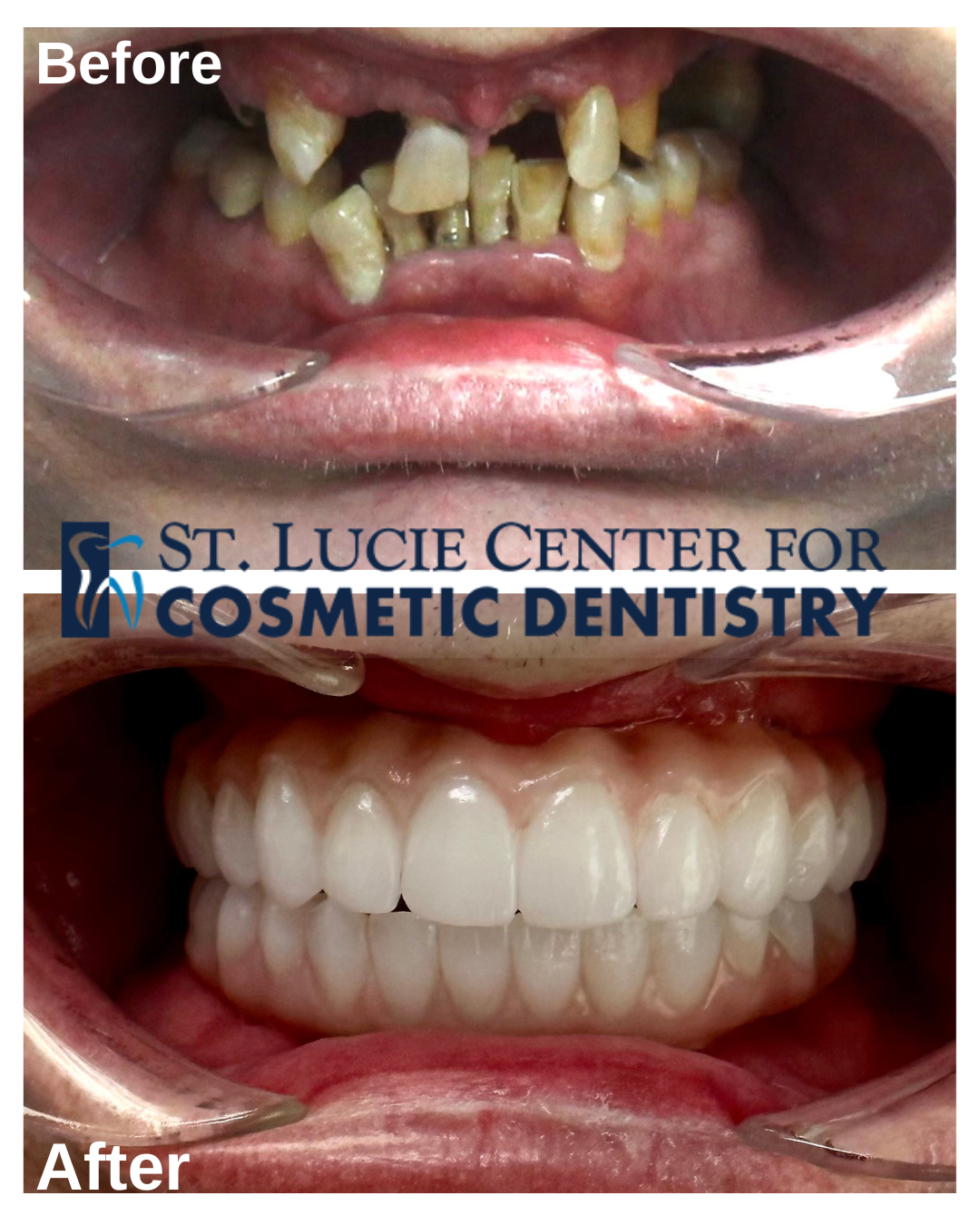Does Insurance Cover Dental Implants?
A Comprehensive Guide to Understanding Your Coverage Options
Navigating the world of dental insurance can often feel like traversing a labyrinth, especially when it comes to understanding coverage for dental implants. Dental implants are a popular and effective solution for replacing missing teeth, offering a permanent and natural-looking alternative to dentures or bridges. However, the question of whether insurance covers dental implants is a common concern for many patients considering this treatment.
The answer is not always straightforward, as it largely depends on the specifics of your insurance plan and the reasons for needing the implants. At St. Lucie Center of Cosmetic Dentistry, we're committed to helping our patients understand their options and make informed decisions about their dental health.

Understanding Insurance Coverage for Dental Implants
Most dental insurance plans categorize dental implants as a cosmetic procedure, which means they may not be covered under standard policies. This is because insurance companies often view implants as an elective treatment rather than a necessary one. However, there are exceptions to this rule.
Key Factors That Influence Insurance Coverage:
- Your specific insurance plan and its coverage limitations
- Whether the implants are deemed medically necessary
- The reason for tooth loss (accident, disease, or congenital condition)
- Whether your plan categorizes implants as cosmetic or functional
If dental implants are deemed medically necessary, such as in cases where they are required to maintain oral health or to replace teeth lost due to an accident or illness, some insurance plans may offer partial coverage. It is crucial to thoroughly review your policy or speak directly with your insurance provider to understand the extent of your coverage.
Types of Insurance Coverage for Dental Implants
Dental Insurance Coverage
Dental insurance plans vary significantly in terms of what they cover. Typically, these plans are designed to cover routine preventive care, such as cleanings and exams, and basic procedures like fillings and extractions. More complex and costly procedures, such as dental implants, often fall into a gray area.
Some comprehensive dental insurance plans may offer more extensive coverage for major procedures, including dental implants. These plans often have higher premiums but can provide significant savings for those requiring extensive dental work.
Medical Insurance Coverage
In certain cases, if the need for implants is due to a medical condition or accident, your medical insurance may cover part of the cost. For example, if you lost teeth due to a traumatic injury or a medical condition that affects your oral health, your medical insurance might consider the implants a necessary part of your treatment.

Supplemental Dental Insurance
Another avenue to explore is supplemental dental insurance. These plans are designed to fill the gaps left by traditional dental insurance and may offer coverage for procedures like dental implants. While these plans often come with additional premiums, they can be a worthwhile investment if you anticipate needing extensive dental work.
When Is the Best Time to Explore Insurance Coverage?
The best time to explore insurance coverage for dental implants is well before you need the procedure. This proactive approach allows you to thoroughly understand your policy, make necessary adjustments, and plan financially for the procedure.

Strategic Planning Tips:
- Review your current dental insurance policy early
- Consider supplemental insurance plans if needed
- Be aware of annual maximum benefits and plan accordingly
- Address existing dental issues before implant placement
- Maintain open communication with your dental care provider
If your current policy does not cover dental implants, or if the coverage is insufficient, it may be beneficial to explore supplemental dental insurance plans. By researching and enrolling in a supplemental plan well in advance of your procedure, you can ensure that you have the necessary coverage when the time comes.
Benefits of Insurance Coverage for Dental Implants
Understanding the benefits of having insurance that covers dental implants can not only alleviate financial stress but also encourage more individuals to pursue this transformative dental procedure.
Main Benefits Include:
- Reduced out-of-pocket expenses: Makes dental implants more accessible to a broader range of people
- Comprehensive care coverage: May include pre-surgical consultations, imaging, and post-operative care
- Peace of mind: Reduces anxiety and stress associated with major dental procedures
- Timely treatment: Encourages individuals to seek treatment sooner rather than later
- Enhanced patient-provider relationships: Fosters open communication about treatment options
By providing coverage for dental implants, insurance plans can motivate patients to address their dental needs promptly, preventing further complications and promoting better overall health. Early intervention can also enhance the success rate of dental implants, as patients are more likely to have healthy gums and sufficient bone density when they seek treatment without delay.
Options When Insurance Doesn’t Cover Dental Implants
For those whose insurance does not cover dental implants, there are still options available to make the procedure more affordable.
Financing Plans
Many dental practices, including the St. Lucie Center of Cosmetic Dentistry, offer financing plans to help make the cost of implants more manageable. These plans often allow patients to spread the cost over several months or even years, making it easier to fit into a budget.
Dental Discount Plans
Some patients may choose to explore dental discount plans, which can provide significant savings on dental procedures, including implants. These plans typically require a membership fee but can offer substantial discounts on a wide range of dental services.
Health Savings Accounts (HSAs) and Flexible Spending Accounts (FSAs)
If your employer offers HSAs or FSAs, these can be valuable resources for covering dental implant costs. These accounts allow you to set aside pre-tax dollars for medical and dental expenses, potentially saving you money in the long run.
Ready to Explore Your Dental Implant Options?
At St. Lucie Center of Cosmetic Dentistry, we understand that navigating insurance coverage for dental implants can be challenging. Our team is here to help you understand your options and find the most cost-effective solution for your needs.
Frequently Asked Questions About Dental Implant Insurance Coverage
What factors influence insurance coverage for dental implants?
Insurance coverage for dental implants can vary significantly depending on several factors, including the specifics of your insurance plan, the reason for the implant, and the overall health of your mouth. Some insurance plans may cover a portion of the cost if the implant is deemed medically necessary, such as in cases where a tooth was lost due to an accident or disease.
Are there any insurance plans that typically cover dental implants?
While traditional dental insurance plans often have limited coverage for implants, some high-tier dental insurance plans or those offered by employers as part of a premium benefits package might include implant coverage. Additionally, some medical insurance plans may cover dental implants if the tooth loss is related to a medical condition or treatment.
How can I maximize my insurance benefits for dental implants?
To maximize your insurance benefits, start by thoroughly understanding your current policy. Contact your insurance provider to clarify what is covered and what is not, and ask about any annual maximums, waiting periods, or exclusions that may apply. If your plan does not cover implants, inquire about alternative procedures that might be covered.
Can I appeal a denied insurance claim for dental implants?
If your insurance claim for dental implants is denied, you have the right to appeal the decision. Start by reviewing the denial letter to understand the reason for the denial, and gather any additional documentation that supports the medical necessity of the implants. Submit a formal appeal to your insurance company, clearly outlining why the procedure should be covered.
Making Informed Decisions About Dental Implants
Understanding the intricacies of insurance coverage for dental implants can be a daunting task, but it is an essential step in making informed decisions about your dental health. By thoroughly reviewing your insurance policies, considering supplemental coverage options, and exploring alternative financing solutions, you can navigate the complexities of dental insurance with confidence.
This proactive approach not only helps in planning financially but also ensures that you can make informed decisions about your oral health. At the St. Lucie Center of Cosmetic Dentistry, we are committed to helping our patients understand their options and find the best solutions for their individual needs.

Whether through insurance, financing, or other means, our goal is to make dental implants an attainable and life-changing solution for restoring your smile. Contact us today to learn more about your options and take the first step toward a healthier, more confident smile.



